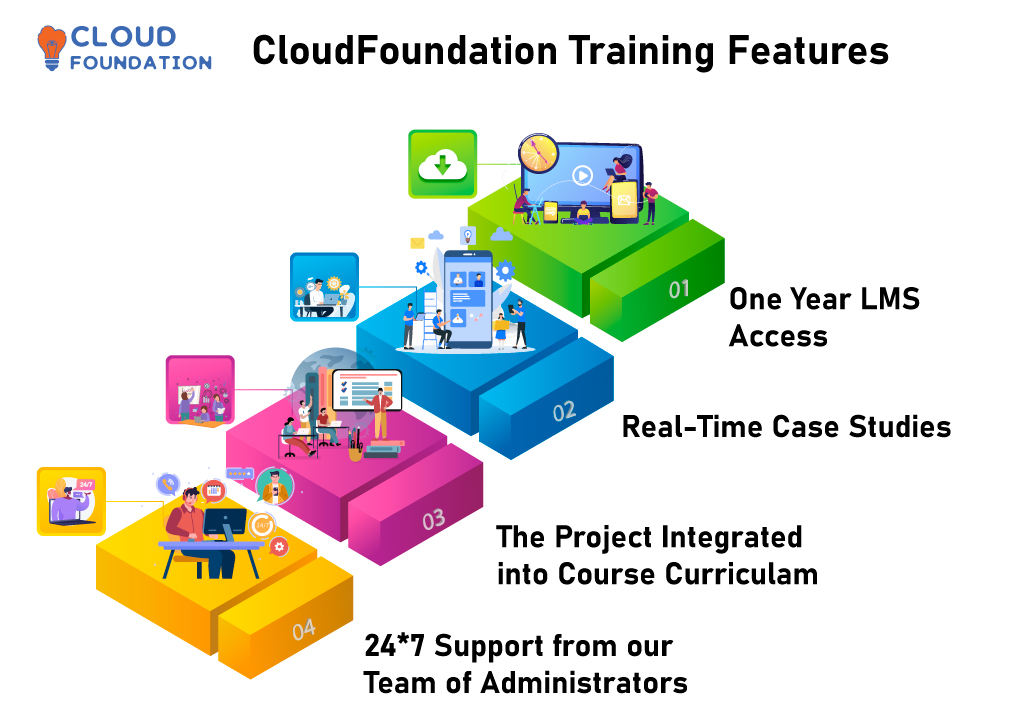Microsoft Azure AZ-203 Training – The only Course you need
⏰26 hours | ▶️ 23 Videos | 📣 12904 Participants | 🎓 5941 Reviews | 4.9 ⭐⭐⭐⭐⭐
Choose a Plan that Works for You
Self Paced
- Advanced sessions
- Interview Q&A
- Free study Materials
- Premium Technical support
Instructor Led Live Training
- Live Instructor
- Advanced sessions
- Interview Q&A
- Premium Technical Support
Corporate Training
- Live Instructor
- Advanced sessions
- Interview Q&A
- Premium Technical Support
Upcoming Batches PST
Weekday
| Jan 06(1 HR A DAY) |
| 06:00 PM PST |
| Enroll Now → |
Weekday
| Jan 26(1 HR A DAY) |
| 06:00 AM PST |
| Enroll Now → |
Weekday
| Jan 23(1 HR A DAY) |
| 07:00 PM PST |
| Enroll Now → |
Upcoming Batches IST
Weekday
| Jan 07(1 HR A DAY) |
| 06:30 AM IST |
| Enroll Now → |
Weekday
| Jan 26(1 HR A DAY) |
| 06:00 PM PST |
| Enroll Now → |
Weekend
| Jan 25(HR A DAY) |
| 07:30 AM IST |
| Enroll Now → |
Course Description
Microsoft Azure 203 training covers different modules of Azure such as infrastructure as a service, developing storage, and implementing cloud security.
Microsoft Azure 203 is one of the crucial cloud players promoted by creating a cloud career in business and marketing.
Our platform takes you under the new challenges about the course to bring out the best outcome of Azure.
Grab weekday and weekend training classes under competent trainers with all-time support.
Get your access to learn the course for azure 203 certification exams, hold a decent exam score, and start your career with the azure associate developer.

Develop Azure Infrastructure as a Service Compute Solution
Implement solutions that use virtual machines (VM)
- provision VMs
- create ARM templates
- configure Azure Disk Encryption for VMs
Implement batch jobs by using Azure Batch Services
- manage batch jobs by using Batch Service API
- run a batch job by using Azure CLI, Azure portal, and other tools
- write code to run an Azure Batch Services batch job
Create containerized solutions
- create an Azure Managed Kubernetes Service (AKS) cluster
- create container images for solutions
- publish an image to the Azure Container Registry
- run containers by using Azure Container Instance or AKS
Develop Azure Platform as a Service Compute Solution
Create Azure App Service Web Apps
- create an Azure App Service Web App
- create an Azure App Service background task by using Web Jobs
- enable diagnostics logging
- create an Azure Web App for Containers
- monitor service health by using Azure Monitor
Create Azure App Service mobile apps
- add push notifications for mobile apps
- enable offline sync for mobile app
- implement a remote instrumentation strategy for mobile devices
Create Azure App Service API apps
- create an Azure App Service API app
- create documentation for the API by using open source and other tools
Implement Azure functions
- implement input and output bindings for a function
- implement function triggers by using data operations, timers, and webhooks
- implement Azure Durable Functions
- create Azure Function apps by using Visual Studio
- implement Python Azure Functions
Develop for Azure storage
Develop solutions that use storage tables
- design and implement policies for tables
- query table storage by using code
- implement partitioning schemes
Develop solutions that use Cosmos DB storage
- create, read, update, and delete data by using appropriate APIs
- implement partitioning schemes
- set the appropriate consistency level for operations
Develop solutions that use a relational database
- provision and configure relational databases
- configure elastic pools for Azure SQL Database
- create, read, update, and delete data tables by using code
- provision and configure Azure SQL Database serverless instances
- provision and configure Azure SQL and Azure PostgreSQL Hyperscale instances
Develop solutions that use blob storage
- move items in Blob storage between storage accounts or containers
- set and retrieve properties and metadata
- implement blob leasing
- implement data archiving and retention
- implement Geo Zone Redundant Storage
Implement Azure security
Implement authentication
- implement authentication by using certificates, forms-based authentication, or tokens
- implement multi-factor or Windows authentication by using Azure AD
- implement OAuth2 authentication
- implement Managed identities/Service Principal authentication
- implement Microsoft identity platform
Implement access control
- implement CBAC (Claims-Based Access Control) authorization
- implement RBAC (Role-Based Access Control) authorization
- create shared access signatures
Implement secure data solutions
- encrypt and decrypt data at rest and in transit
- create, read, update, and delete keys, secrets, and certificates by using the Key Vault API
Monitor, troubleshoot, and optimize Azure solutions
Develop code to support scalability of apps and services
- implement auto scaling rules and patterns (schedule, operational/system metrics, singleton applications)
- implement code that handles transient faults
- implement AKS scaling strategies
Integrate caching and content delivery within solutions
- store and retrieve data in Azure Redis cache
- develop code to implement CDN’s in solutions
- invalidate cache content (CDN or Redis)
Instrument solutions to support monitoring and logging
- configure instrumentation in an app or service by using Application Insights
- analyze and troubleshoot solutions by using Azure Monitor
- implement Application Insights Web Test and Alerts
Connect to and consume Azure services and third-party services
Develop an App Service Logic App
- create a Logic App
- create a custom connector for Logic Apps
- create a custom template for Logic Apps
Integrate Azure Search within solutions
- create an Azure Search index
- import searchable data
- query the Azure Search index
- implement cognitive search
Implement API management
- establish API Gateways
- create an APIM instance
- configure authentication for APIs
- define policies for APIs
Develop event-based solutions
- implement solutions that use Azure Event Grid
- implement solutions that use Azure Notification Hubs
- implement solutions that use Azure Event Hub
Develop message-based solutions
- implement solutions that use Azure Service Bus
- implement solutions that use Azure Queue Storage queues
Develop Azure compute solutions
Implement IaaS solutions
- provision VMs
- create ARM templates
- create container images for solutions
- publish an image to the Azure Container Registry
- run containers by using Azure Container Instance
Create Azure App Service Web Apps
- create an Azure App Service Web App
- enable diagnostics logging
- deploy code to a web app
- configure web app settings
- implement auto scaling rules (schedule, operational/system metrics)
Implement Azure functions
- implement input and output bindings for a function
- implement function triggers by using data operations, timers, and webhooks
- implement Azure Durable Functions
Develop for Azure storage
Develop solutions that use Cosmos DB storage
- select the appropriate API for your solution
- implement partitioning schemes
- interact with data using the appropriate SDK
- set the appropriate consistency level for operations
- create Cosmos DB containers
Develop solutions that use blob storage
- move items in Blob storage between storage accounts or containers
- set and retrieve properties and metadata
- interact with data using the appropriate SDK
- implement data archiving and retention
Implement Azure security
Implement user authentication and authorization
- implement OAuth2 authentication
- create and implement shared access signatures
- register apps and use Azure Active Directory to authenticate users
Implement secure cloud solutions
- secure app configuration data by using the App Configuration and Key Vault API
- manage keys, secrets, and certificates by using the Key Vault API
- implement Managed Identities for Azure resources
Monitor, troubleshoot, and optimize Azure solutions
Integrate caching and content delivery within solutions
- develop code to implement CDN’s in solutions
- configure cache and expiration policies
- store and retrieve data in Azure Redis cache
Instrument solutions to support monitoring and logging
- configure instrumentation in an app or service by using Application Insights
- analyze and troubleshoot solutions by using Azure Monitor
- implement Application Insights Web Test and Alerts
- implement code that handles transient faults
Connect to and consume Azure services and third-party services
Develop an App Service Logic App
- create a Logic App
- create a custom connector for Logic Apps
- create a custom template for Logic Apps
Implement API Management
- create an APIM instance
- configure authentication for APIs
- define policies for APIs
Develop event-based solutions
Note: Creating event models is in scope
- implement solutions that use Azure Event Grid
- implement solutions that use Azure Notification Hubs
- implement solutions that use Azure Event Hub
Develop message-based solutions
- implement solutions that use Azure Service Bus
- implement solutions that use Azure Queue Storage queues
FAQ’s
❓ Do you offer any discount/offer?
✅ Yes, offers keep changing from time to time. You can chat with us or call our training coordinator for more details.
❓ Is there any demo video which I can watch before enrolling to the course?
✅ Yes, we have provided a Demo video section on each course page so that you can get a glimpse into the course you want to enroll.
❓ How soon after signing up would I get access to the learning content?
✅ Yes, we will provide access to all the learning materials after the complete payment for the course.
Suggested Courses




Blue Prism Training
⭐⭐⭐⭐⭐
😃 320 Learners




Robotic Process Automation (RPA) Training
⭐⭐⭐⭐⭐
😃 331 Learners




OpenSpan Training
⭐⭐⭐⭐⭐
😃 30 Learners




Automation Anywhere
⭐⭐⭐⭐⭐
😃 112 Learners
A few of our students
















Contact Us